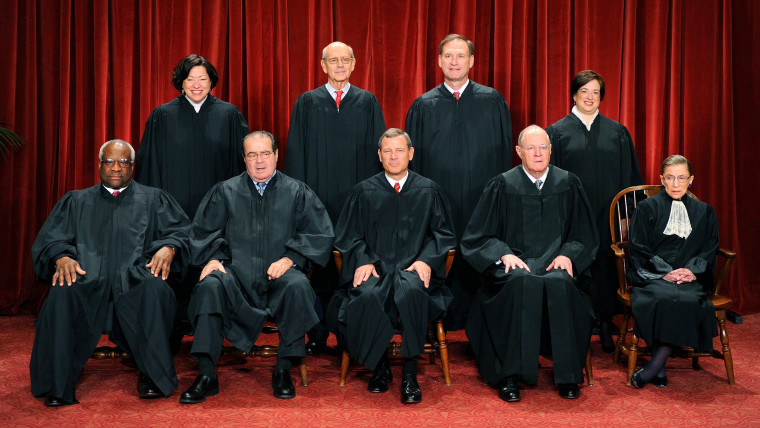Now that a federal appeals panel has struck down one state's ban on gay marriage, the stage is set for the U.S. Supreme Court to weigh in and decide the matter for the entire country.
Although the high court doesn't have to take up the debate, many experts believe the wave of lower-court rulings makes it all but certain the justices will tackle it.
Less clear is the timeline for action and, of course, the outcome of a case that would decide whether states can block gays and lesbians from tying the knot.
"Supreme Court review is inevitable in the next two years," said Tom Goldstein of SCOTUSblog. "They aren't required to hear it, but this is the major social issue of the day."
There have been lower court rulings against state bans in a dozen of the 31 states where same-sex marriage is not legal.
Last week, the 10th U.S. Circuit Court of Appeals was the first federal appeals panels to strike down a ban — this one in Utah — with a 2-1 decision on a lawsuit filed by couples Derek Kitchen and Moudi Sbeity, Laurie Wood and Kody Partridge, and Karen Archer and Kate Call.
Utah's attorney general has already indicated he will appeal and has two possible routes: ask all the judges on the 10th Circuit to take another look in what's called an en banc hearing, or petition the Supreme Court for a writ of certiorari agreeing to take up the case.
If he takes the first road, it could be months, possibly a year, before there's a ruling that could then be brought to the Supreme Court.
They aren't required to hear it, but this is the major social issue of the day.
Going directly to the high court could speed up the process — but that's a relative term. The justices wouldn't announce until the fall whether they will hear the case, and then they would have until next June to issue a decision.
And that's only if they decide to hear the Utah case right off the bat.
"They could let it percolate for a longer period of time," said Evan Wolfson of Freedom to Marry, an architect of the national strategy to secure gay marriage rights.
Challenges to the ban have reached several other appeals courts — the 4th, 5th, 6th, 7th and 9th circuits — and the Washington justices could wait for some of those rulings to come down.
"One of the factors that tends to make it more likely that a court takes a case is when there is a conflict in the circuits," Wolfson noted.
John Eastman, chairman of the board of the National Organization for Marriage, which opposes same-sex nuptials, said he expects two and possibly three more circuit rulings by the time the Supreme Court comes back from its summer break.
If the federal government had to defer to New York's policy decision to redefine marriage, mustn't it likewise defer to state policy judgments that decide not to do that?
Given the high profile of the cases and the Supreme Court's willingness to examine California's Proposition 8 case last year, Eastman thinks its "extremely likely" that the justices will agree to hear arguments on the Utah challenge or another circuit case.
And, he said, he is "cautiously optimistic" that his side will win.
Eastman cites Justice Anthony Kennedy's opinion in the landmark ruling in U.S. vs. Windsor, in which the court ruled 5-4 that the feds had to recognize the marriage of a lesbian from New York — one of the 19 states where it was legalized.
Although he might have preferred a different outcome, Eastman said Kennedy's reasoning gave him hope that state bans would survive Supreme Court review.
Kennedy, he said, "focused extensively on the primary role states have played in setting marriage policy. If the federal government had to defer to New York's policy decision to redefine marriage, mustn't it likewise defer to state policy judgments that decide not to do that?"
But Wolfson said the Windsor case is what gives him confidence that the Supreme Court "will do what's right."
"It demolished every argument put forward to justify this discrimination," he said. "They heard all the justifications put forward and found them lacking."
Rising public approval of gay marriage — more than half of Americans say they support it and conservative Republicans aren't as vocal as they once were — will also influence the outcome, he said.
"Judges are human beings and sometimes courts don't want to get too far out in front," he said. "But we're saying loudly and clearly that right now America is ready for the freedom to marry."
